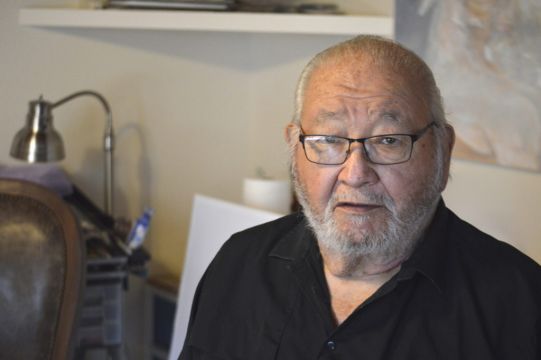N Scott Momaday, a Pulitzer Prize-winning storyteller, poet, educator and folklorist whose debut novel House Made Of Dawn is widely credited as the starting point for contemporary Native American literature, has died aged 89.
Momaday died on Wednesday at his home in Santa Fe, New Mexico, publisher HarperCollins announced. He had been in failing health.
“Scott was an extraordinary person and an extraordinary poet and writer. He was a singular voice in American literature, and it was an honour and a privilege to work with him,” Momaday’s editor, Jennifer Civiletto, said in a statement.
“His Kiowa heritage was deeply meaningful to him and he devoted much of his life to celebrating and preserving Native American culture, especially the oral tradition.”
House Made Of Dawn, published in 1968, tells of a Second World War soldier who returns home and struggles to fit back into the Native community in rural New Mexico. Much of the book was based on Momaday’s childhood in Jemez Pueblo, New Mexico, and on his conflicts between the ways of his ancestors and the risks and possibilities of the outside world.
“I grew up in both worlds and straddle those worlds even now,” Momaday said in a 2019 PBS documentary. “It has made for confusion and a richness in my life.”
Novels by American Indians were not widely recognised at the time of House Made Of Dawn. A New York Times reviewer, Marshall Sprague, even contended in an otherwise favourable review that “American Indians do not write novels and poetry as a rule, or teach English in top-ranking universities, either. But we cannot be patronising. N Scott Momaday’s book is superb in its own right.”
Like Joseph Heller’s Catch-22, Momaday’s novel was a Second World War story that resonated with a generation protesting against the Vietnam War.
In 1969, Momaday became the first Native American to win the fiction Pulitzer, and his novel helped launch a generation of authors, including Leslie Marmon Silko, James Welch and Louise Erdrich. His admirers would range from the poet Joy Harjo, the country’s first Native to be named poet laureate, to the film stars Robert Redford and Jeff Bridges.
Over the following decades, he taught at Stanford, Princeton and Columbia universities, among other top-ranking colleges, was a commentator for NPR, and lectured worldwide.
He published more than a dozen books, from Angle of Geese And Other Poems to the novels The Way To Rainy Mountain and The Ancient Child, and became a leading advocate for the beauty of traditional Native life.
He shared stories told to him by his parents and grandparents. He regarded oral culture as the wellspring of language and storytelling, and dated American culture back not to the early English settlers, but also to ancient times, noting the procession of gods depicted in the rock art at Utah’s Barrier Canyon.
“We do not know what they mean, but we know we are involved in their meaning,” he wrote in the essay The Native Voice In American Literature.
“They persist through time in the imagination, and we cannot doubt that they are invested with the very essence of language, the language of story and myth and primal song. They are 2,000 years old, more or less, and they remark as closely as anything can the origin of American literature.”
In 2007, President George W Bush presented Momaday with a National Medal of Arts “for his writings and his work that celebrate and preserve Native American art and oral tradition”. Besides his Pulitzer, his honours included an Academy of American Poets prize and, in 2019, the Dayton Literary Peace Prize.
Momaday was married twice, most recently to Regina Heitzer. He had four daughters, one of whom, Cael, died in 2017.
He was born Navarre Scott Mammedaty, in Lawton, Oklahoma, and was a member of the Kiowa Tribe. His mother was a writer, and his father an artist.
After spending his teens in New Mexico, he studied political science at the University of Mexico and received a master’s and PhD in English from Stanford.
Momaday began as a poet, his favorite art form, and the publication of House Made Of Dawn was an unintentional result of his early reputation. Editor Fran McCullough, of what is now HarperCollins, had met Momaday at Stanford and several years later contacted him and asked whether he would like to submit a book of poems.
Momaday did not have enough for a book, and instead gave her the first chapter of House Made Of Dawn.
After more than half a century since the publication of his first novel, Momaday said he was humbled that writers continued to say his work has influenced them.
“I’m greatly appreciative of that, but it comes a little bit of a surprise every time I hear it,” Momaday said. “I think I have been an influence. It’s not something I take a lot of credit for.”







